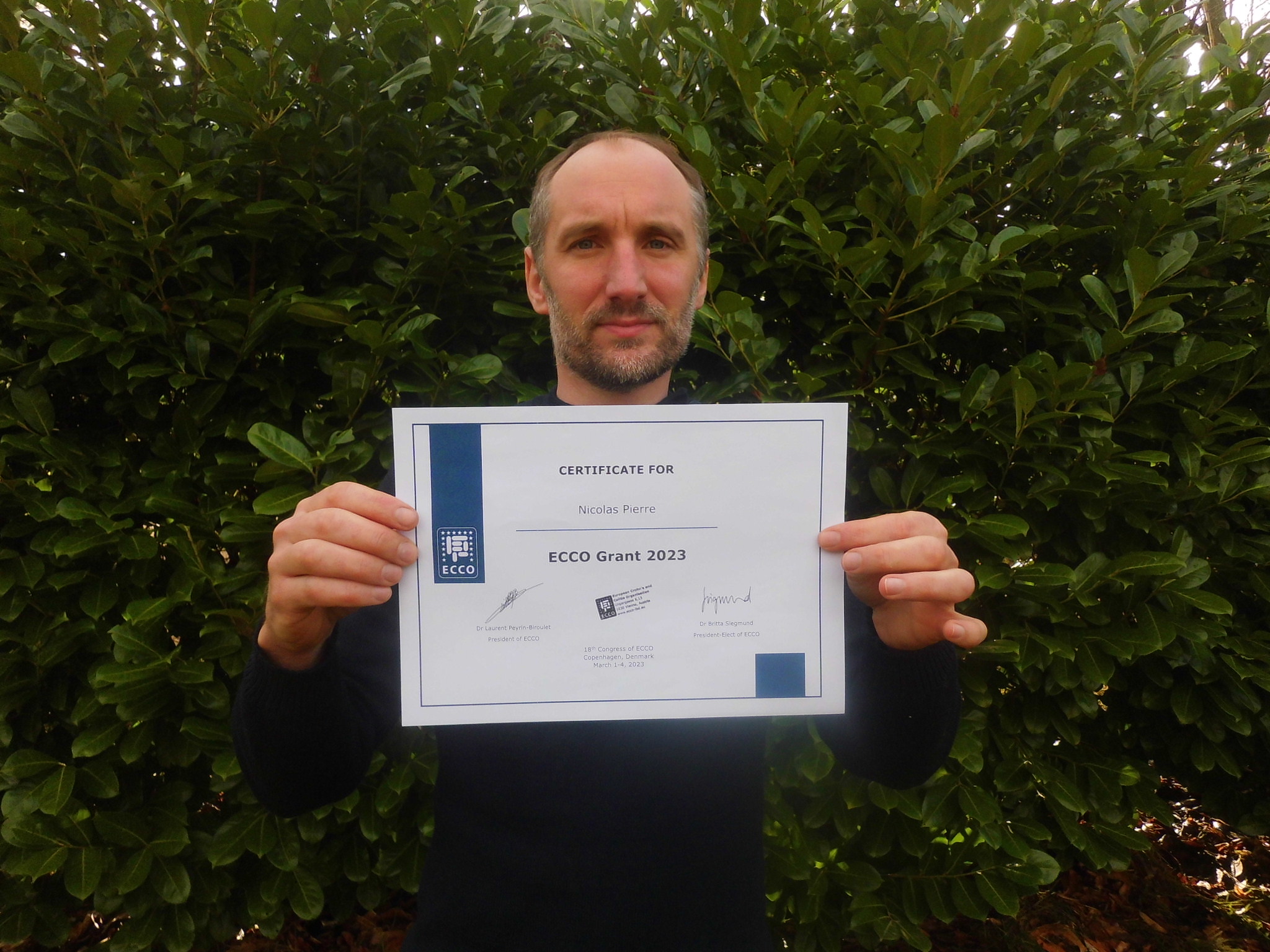ECCO Grant Study Synopsis: Nicolas Pierre
Nicolas Pierre, ECCO Grant Awardee
Development of biomarker signatures as an alternative to endoscopy: looking beyond inflammation
 Nicolas Pierre © Nicolas Pierre |
Background & aim of research
In Crohn’s Disease (CD), the treat-to-target strategy has become the standard of care [1, 2]. This clinical concept consists in escalating/optimising the treatment (e.g. dose, frequency, type of drugs) until a state of remission (target) is achieved. Overall, treatment targets evolve towards a deeper level of remission and it is in this context that endoscopic remission has become a primary objective. However, endoscopy remains invasive and costly, is not well accepted by patients and does not allow tight control of disease activity. Thus, attention is turning to non-invasive biomarkers that can replace endoscopy. Our group recently made progress in monitoring disease activity with blood proteins. More precisely, we found distinct biological profiles to be associated with the risk of short-term and mid/long-term relapse in CD patients who stop infliximab [3–5]. By measuring 161 blood proteins, we captured a more complete picture of the disease activity than is achieved with classic inflammatory markers. Clearly, looking beyond inflammation is necessary in order to monitor disease activity more effectively. Based on our previous work, we aim to develop biomarker signatures as an alternative to endoscopy.
Methodology/experiments that will be used
The project relies on the CREDO cohort, which has been designed to develop a novel index/score defining endoscopic remission [6]. CREDO is a longitudinal prospective (2-year follow-up) and non-interventional study in which CD patients are in remission at the time of a planned endoscopy with blood sampling (baseline). In the baseline serum of these patients, 161 blood proteins (see above) will be measured by proximity extension assay [7] and selected reaction monitoring [8]. The level of these markers will be associated with endoscopic information (absence vs presence of ulcers, novel index/score of endoscopic remission), risk of relapse and disease location.
Anticipated main impact
The project will contribute to the selection of biomarker candidates with the aim of sparing some endoscopic examinations. At a fundamental level, the generated results will help to characterise the biological activity of CD.
Proposed timeline
The experiments are planned for 2023–2024.
References
- Turner D, Ricciuto A, Lewis A, et al. STRIDE-II: An update on the Selecting Therapeutic Targets in Inflammatory Bowel Disease (STRIDE) initiative of the International Organization for the Study of IBD (IOIBD): Determining therapeutic goals for treat-to-target strategies in IBD. Gastroenterology 2021;160:1570–83.
- Peyrin-Biroulet L, Sandborn W, Sands BE, et al. Selecting Therapeutic Targets in Inflammatory Bowel Disease (STRIDE): Determining therapeutic goals for treat-to-target. Am J Gastroenterol 2015;110:1324–38.
- Pierre N, Baiwir D, Huynh-Thu VA, et al. Discovery of biomarker candidates associated with the risk of short-term and mid/long-term relapse after infliximab withdrawal in Crohn’s patients: a proteomics-based study. Gut 2021;70:1450–7.
- Pierre N, Huynh-Thu VA, Marichal T, et al. Distinct blood protein profiles associated with the risk of short-term and mid/long-term clinical relapse in patients with Crohn’s disease stopping infliximab: when the remission state hides different types of residual disease activity. Gut 2023;72:443–50.
- Pierre N, Huynh-Thu VA, Baiwir D, et al. OP02 Distinct biological profiles associated with the risk of short-term relapse and mid/long-term relapse in Crohn’s disease patients stopping infliximab. J Crohns Colitis 2023;17(Suppl 1):i3–6.
- Bossuyt P, Louis E, Mary J-Y, Vermeire S, Bouhnik Y. Defining endoscopic remission in ileocolonic Crohn’s disease: Let’s start from scratch. J Crohns Colitis 2018;12:1245–8.
- Assarsson E, Lundberg M, Holmquist G, et al. Homogenous 96-plex PEA immunoassay exhibiting high sensitivity, specificity, and excellent scalability. PLoS One 2014;9:e95192.
- Picotti P, Aebersold R. Selected reaction monitoring-based proteomics: workflows, potential, pitfalls and future directions. Nat Methods 2012;9:555–66.